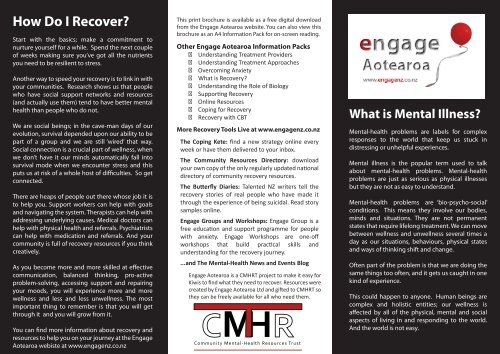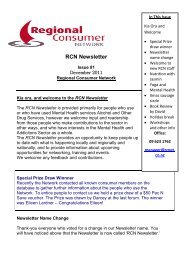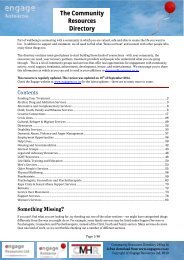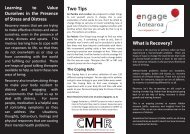What is Mental Illness Info Brochure - Engage Aotearoa
What is Mental Illness Info Brochure - Engage Aotearoa
What is Mental Illness Info Brochure - Engage Aotearoa
- No tags were found...
Create successful ePaper yourself
Turn your PDF publications into a flip-book with our unique Google optimized e-Paper software.
How Do I Recover?Start with the basics; make a commitment tonurture yourself for a while. Spend the next coupleof weeks making sure you’ve got all the nutrientsyou need to be resilient to stress.Another way to speed your recovery <strong>is</strong> to link in withyour communities. Research shows us that peoplewho have social support networks and resources(and actually use them) tend to have better mentalhealth than people who do not.We are social beings; in the cave-man days of ourevolution, survival depended upon our ability to bepart of a group and we are still ‘wired’ that way.Social connection <strong>is</strong> a crucial part of wellness, whenwe don’t have it our minds automatically fall intosurvival mode when we encounter stress and th<strong>is</strong>puts us at r<strong>is</strong>k of a whole host of difficulties. So getconnected.There are heaps of people out there whose job it <strong>is</strong>to help you. Support workers can help with goalsand navigating the system. Therap<strong>is</strong>ts can help withaddressing underlying causes. Medical doctors canhelp with physical health and referrals. Psychiatr<strong>is</strong>tscan help with medication and referrals. And yourcommunity <strong>is</strong> full of recovery resources if you thinkcreatively.As you become more and more skilled at effectivecommunication, balanced thinking, pro-activeproblem-solving, accessing support and repairingyour moods, you will experience more and morewellness and less and less unwellness. The mostimportant thing to remember <strong>is</strong> that you will getthrough it and you will grow from it.You can find more information about recovery andresources to help you on your journey at the <strong>Engage</strong><strong>Aotearoa</strong> web<strong>is</strong>te at www.engagenz.co.nzTh<strong>is</strong> print brochure <strong>is</strong> available as a free digital downloadfrom the <strong>Engage</strong> <strong>Aotearoa</strong> website. You can also view th<strong>is</strong>brochure as an A4 <strong>Info</strong>rmation Pack for on-screen reading.Other <strong>Engage</strong> <strong>Aotearoa</strong> <strong>Info</strong>rmation PacksUnderstanding Treatment ProvidersUnderstanding Treatment ApproachesOvercoming Anxiety<strong>What</strong> <strong>is</strong> Recovery?Understanding the Role of BiologySupporting RecoveryOnline ResourcesCoping for RecoveryRecovery with CBTMore Recovery Tools Live at www.engagenz.co.nzThe Coping Kete: find a new strategy online everyweek or have them delivered to your inbox.The Community Resources Directory: downloadyour own copy of the only regularly updated nationaldirectory of community recovery resources.The Butterfly Diaries: Talented NZ writers tell therecovery stories of real people who have made itthrough the experience of being suicidal. Read storysamples online.<strong>Engage</strong> Groups and Workshops: <strong>Engage</strong> Group <strong>is</strong> afree education and support programme for peoplewith anxiety. <strong>Engage</strong> Workshops are one-offworkshops that build practical skills andunderstanding for the recovery journey....and The <strong>Mental</strong>-Health News and Events Blog<strong>Engage</strong> <strong>Aotearoa</strong> <strong>is</strong> a CMHRT project to make it easy forKiw<strong>is</strong> to find what they need to recover. Resources werecreated by <strong>Engage</strong> <strong>Aotearoa</strong> Ltd and gifted to CMHRT sothey can be freely available for all who need them.M HCommunity <strong>Mental</strong>-Health Resources Trust<strong>What</strong> <strong>is</strong> <strong>Mental</strong> <strong>Illness</strong>?<strong>Mental</strong>-health problems are labels for complexresponses to the world that keep us stuck ind<strong>is</strong>tressing or unhelpful experiences.<strong>Mental</strong> illness <strong>is</strong> the popular term used to talkabout mental-health problems. <strong>Mental</strong>-healthproblems are just as serious as physical illnessesbut they are not as easy to understand.<strong>Mental</strong>-health problems are ‘bio-psycho-social’conditions. Th<strong>is</strong> means they involve our bodies,minds and situations. They are not permanentstates that require lifelong treatment. We can movebetween wellness and unwellness several times aday as our situations, behaviours, physical statesand ways of thinking shift and change.Often part of the problem <strong>is</strong> that we are doing thesame things too often, and it gets us caught in onekind of experience.Th<strong>is</strong> could happen to anyone. Human beings arecomplex and hol<strong>is</strong>tic entities; our wellness <strong>is</strong>affected by all of the physical, mental and socialaspects of living in and responding to the world.And the world <strong>is</strong> not easy.
<strong>Mental</strong>-health problemsare not brain d<strong>is</strong>ordersA brain d<strong>is</strong>order <strong>is</strong>:Parkinson’s d<strong>is</strong>ease: when brains stopprocessing dopamine properly.Huntington’s d<strong>is</strong>ease: when people have agene that causes mutations in areas of the brain.Sometimes mental-health problems can happenfollowing a head injury or physical illness; our brainsand bodies are a crucial part of the wellness mix.Experience of head injury, brain d<strong>is</strong>orders and physicalillness can lead to experience of mental-healthproblems. But so can the experience of loss, prolongedwork stress, trauma, childhood d<strong>is</strong>tress, neglect,bullying, ostrac<strong>is</strong>m and any number of other accidents,m<strong>is</strong>takes and acts of nature that impact on the way wesee and interact with the world.A mental-health problem <strong>is</strong>:DepressionGeneral<strong>is</strong>ed Anxiety D<strong>is</strong>orderBipolar D<strong>is</strong>orderSchizophrenia spectrum d<strong>is</strong>ordersPanic D<strong>is</strong>orderBorderline Personality D<strong>is</strong>order...These are all labels that have been created by theAmerican Psychiatric Association in their diagnosticmanual, the DSM.These labels describe different clusters of troubling orunwanted experiences that reliably occur togetheroften. These experiences can be caused by manydifferent things and there <strong>is</strong> no single cause that <strong>is</strong> thesame for all people, even if they have the samediagnos<strong>is</strong>.Our Brains AreProcessors<strong>What</strong> <strong>is</strong> happening in our brains often says just asmuch about what <strong>is</strong> happening around us and whatthat means to us as it does about how healthy ourbrain <strong>is</strong>.It <strong>is</strong> also true that the way we act and think affects ourneuro-chem<strong>is</strong>try. Some behaviours and ways ofthinking hold us in the same mood states for a longtime and sensit<strong>is</strong>e those response pathways in ourbrains. It can become difficult to change theseresponse pathways by ourselves; not only do we needto change the powerful habits that have shaped ourreality and the situations that set them up in the firstplace, but we’ve got to deal with these physical‘hair-triggers’ too.Th<strong>is</strong> <strong>is</strong> why some people find that medications can behelpful for a while; they can work to balance out thephysical responses and allow you to work on thethinking patterns and behaviour.Many people recover from mental-health problemsby accessing non-medical forms of treatment andsupport. Talking therapies like CBT, DBT and ACT havebeen shown to be effective treatments for mostmental-health problems.A lot of people also find that exerc<strong>is</strong>e and nutritionplay a key role; a great deal of research suggestsexerc<strong>is</strong>e may be as effective as antidepressants!If you can change the input you are giving your brain,you can change the way it responds to things andchange your mental-health experiences.No matter what, it <strong>is</strong> possible to learn new ways ofbeing and start strengthening some new responsepathways for yourself.<strong>What</strong> Does aDiagnos<strong>is</strong> Mean?If you have received a diagnos<strong>is</strong> and it <strong>is</strong> correct, itmeans that you experience a certain cluster ofbehaviours, thinking styles and feelings that d<strong>is</strong>ruptyour ability to live well and cause you to becomestuck in some unhelpful and often pretty d<strong>is</strong>tressingexperiences.These unhelpful experiences may be described asmania, hearing voices, depression, feeling hopeless,loss of pleasure, difficulty concentrating, intensifiedemotions, delusions, paranoia or panic attacks.Every diagnos<strong>is</strong> has differences and each personexperiences it in their own way, but there are manycommonalities too.In each case there are situations, behaviours and waysof thinking that help set up the experience and keepit going. These could be learned responses to difficultthings that have happened, either recently or in thepast. A lot of people with mental-health problemshave been through trauma in their lives, but th<strong>is</strong> <strong>is</strong>n’ttrue for everyone.A diagnos<strong>is</strong> doesn’t say anything about what mightbe causing the problem. They just describe what thesymptoms of it are. No matter what the mental-healthproblem <strong>is</strong>, we are ALL people responding to ourworlds.Nearly half of the population will go through amental-health problem in their lifetimes. So it <strong>is</strong> acompletely normal thing to face as part of beinghuman in th<strong>is</strong> world. A mental d<strong>is</strong>order diagnos<strong>is</strong> <strong>is</strong>nothing to be ashamed of. A diagnos<strong>is</strong> <strong>is</strong> not a sign ofweakness; it <strong>is</strong> a sign that we are struggling in ourresponse to something and could do with some help.





